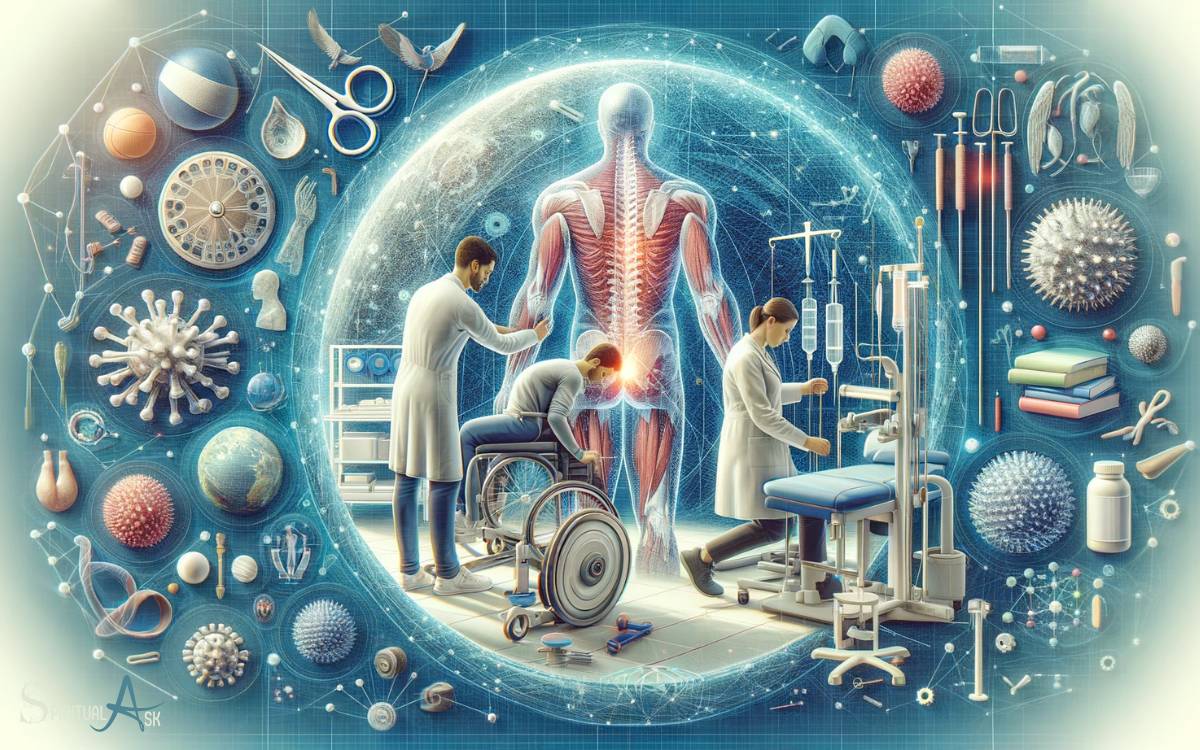Spiritual Healing Vs Physical Healing: Comparison!
Spiritual healing and physical healing are two complementary approaches to health, each addressing different aspects of an individual’s well-being.
Physical healing typically involves treating the body’s ailments through medical interventions, whereas spiritual healing focuses on aligning and nurturing the inner self to promote overall wellness.
Physical healing is often associated with the medical field and aims at curing diseases or repairing injuries through methods such as medication, surgery, or therapy.
On the other hand, spiritual healing is concerned with the intangible elements of life and seeks to balance and heal the mind, emotions, and spirit, often through practices like meditation, prayer, or energy work. Embodied spiritual experiences can vary widely and may include feeling a profound sense of peace, connection, or purpose, or may manifest as physical sensations such as tingling or warmth. Many people find that incorporating spiritual healing practices into their daily lives can lead to a greater sense of overall well-being and a deeper connection to themselves and others. By addressing both the physical and non-physical aspects of life, spiritual healing offers a holistic approach to health and wellness.
For example, someone recovering from surgery (physical healing) might also engage in meditation (spiritual healing) to cope with the emotional stress of the experience.
Integrating spiritual and physical healing approaches can lead to a more holistic and effective path to wellness.

Key Takeaway
5 Aspects: Spiritual Healing and Physical Healing
| Aspect | Physical Healing | Spiritual Healing |
|---|---|---|
| Focus | Body | Mind, Soul, Emotions |
| Methods | Medication, Surgery, Therapy | Meditation, Prayer, Energy Work |
| Practitioners | Doctors, Surgeons, Physical Therapists | Spiritual Healers, Meditation Instructors |
| Healing Outcome | Cure diseases, Repair injuries | Inner peace, Emotional balance, Mindfulness |
| Measurement | Test results, Physical improvement | Personal reflection, Sense of well-being |
Understanding Spiritual Healing
How can spiritual healing impact one’s overall well-being and health? For me, spiritual healing has been a profound journey of self-discovery and inner peace.

It’s about finding a sense of connection to something greater than myself, whether it’s through meditation, prayer, or simply spending time in nature.
Spiritual healing has helped me to release negative emotions, find forgiveness, and cultivate a more positive outlook on life. It’s about nurturing my soul and finding a deeper sense of purpose and meaning.
Exploring Physical Healing

Let’s talk about physical healing and the various medical treatments and therapies that play a crucial role in recovery.
I’ll also touch on how physical healing impacts our daily lives and the importance of prevention in maintaining overall well-being.
It’s essential to understand the practical aspects of physical healing and its significance in our lives.
Medical Treatments and Therapies
As a patient, I have experienced the effectiveness of various medical treatments and therapies in addressing physical ailments.
These interventions have been crucial in my journey towards recovery, and I believe they play a significant role in the healing process.
Specifically, I have found the following to be particularly impactful:
- Medication: Properly prescribed medications have alleviated my symptoms and contributed to the management of my condition.
- Pain relief: Medications have effectively managed my pain, significantly improving my quality of life.
- Symptom control: Medications have helped in controlling and reducing the severity of my symptoms, allowing me to function better on a daily basis.
- Disease management: Medications have played a vital role in managing my chronic condition, preventing exacerbations and promoting stability.
These treatments have truly made a difference in my physical well-being.
Impact on Daily Life
While acknowledging the benefits of medical treatments and therapies, the impact on my daily life is evident in the alleviation of symptoms and improved functionality.
Managing my physical health through medical interventions has allowed me to perform daily tasks with greater ease and reduced discomfort. Before receiving treatment, simple activities like walking or concentrating at work were challenging.
However, with the help of medical care, I’ve experienced a significant improvement in my ability to carry out these tasks.
This has positively influenced my overall quality of life, enabling me to engage in activities that were previously restricted by my health issues.
The relief from physical symptoms has not only enhanced my daily life but also provided the mental and emotional freedom to pursue personal and professional goals.
As we delve into the importance of prevention, it’s essential to recognize how medical interventions have impacted my daily routines and long-term wellness.
Importance of Prevention
My experience has taught me the importance of prevention in maintaining my physical well-being.
Through regular exercise, balanced nutrition, and sufficient rest, I have found that I am better equipped to ward off illness and maintain overall wellness.
In my journey, I have come to understand that prevention plays a crucial role in promoting physical health, and it is often easier to prevent health issues than to treat them after they arise.
My approach to prevention includes:
- Regular physical activity: Engaging in activities I enjoy to make exercise a sustainable habit
- Balanced nutrition: Incorporating a variety of fruits, vegetables, and whole grains into my diet
- Sufficient rest: Prioritizing sleep and managing stress to support my body’s natural healing processes
By emphasizing prevention, I have experienced improved physical health and overall well-being.
The Mind-Body Connection

The mind-body connection plays a significant role in both spiritual and physical healing. Our thoughts, emotions, and beliefs can directly influence our physical health.
When we are spiritually unwell, it can manifest in physical symptoms, and when we are physically unwell, it can affect our spiritual well-being.
This interconnectedness highlights the importance of addressing both the mind and body in the healing process.
Practices such as meditation, prayer, and mindfulness not only promote spiritual well-being but also have been shown to have positive effects on physical health.
Similarly, physical activities like yoga and tai chi not only benefit the body but also have a positive impact on mental and emotional well-being.
Understanding and nurturing this mind-body connection is essential for holistic healing and overall well-being.
Benefits of Spiritual Healing
When it comes to the benefits of spiritual healing, inner peace and clarity play a significant role in one’s overall well-being.

The holistic mind-body connection that spiritual healing fosters can lead to a sense of balance and harmony in life. These benefits can have a profound impact on both mental and physical health.
Inner Peace and Clarity
Experiencing inner peace and clarity is an invaluable benefit of spiritual healing. When I achieve inner peace through spiritual healing, I feel a profound sense of calm and tranquility that permeates every aspect of my life.
This inner peace allows me to navigate life’s challenges with a sense of groundedness and emotional stability.
Additionally, the clarity I gain from spiritual healing helps me gain a deeper understanding of myself and the world around me.
This clarity provides me with a sense of purpose and direction, allowing me to make decisions that are aligned with my true values and aspirations.
Furthermore, spiritual healing fosters a sense of harmony within myself, enabling me to approach life with a balanced and centered perspective.
Holistic Mind-Body Connection
Achieving inner peace and clarity through spiritual healing significantly impacts my holistic mind-body connection, fostering a sense of harmony and balance within myself. When I am spiritually aligned, I notice that my physical body responds positively.
I feel more energetic, and my overall well-being improves. This mind-body harmony allows me to manage stress more effectively, which, in turn, reduces the physical toll that stress can take on my body.
Additionally, spiritual healing helps me to be more in tune with my body’s needs, leading to healthier lifestyle choices.
I find that I am more inclined to engage in activities that promote physical health, such as exercise and proper nutrition.
Overall, the interconnectedness of spiritual and physical well-being is undeniable, and nurturing one aspect undoubtedly benefits the other.
Impact on Emotional Well-being
I’ve noticed that spiritual healing often lifts my emotional well-being in ways that physical healing alone cannot.

When I engage in spiritual healing practices, such as meditation or prayer, I experience a deep sense of inner peace and calmness that helps me cope with emotional challenges.
Additionally, spiritual healing provides a sense of purpose and connection to something greater than myself, which brings comfort during difficult times.
Furthermore, spiritual healing encourages self-reflection and personal growth, allowing me to process and release negative emotions more effectively.
Lastly, by fostering a positive mindset and promoting acceptance, spiritual healing helps me develop resilience and emotional strength in navigating life’s ups and downs.
Holistic Approach to Healing
Embracing a holistic approach to healing involves integrating the interconnected aspects of mind, body, and spirit to promote overall well-being.
This approach recognizes that an individual is more than just a physical body with symptoms to be treated.

It acknowledges the influence of thoughts, emotions, and spiritual well-being on one’s health. Holistic healing emphasizes the importance of addressing the root causes of illness, rather than just alleviating symptoms.
It often involves a combination of conventional medicine and alternative therapies such as acupuncture, meditation, and nutritional counseling.
By considering the whole person and their unique circumstances, holistic healing aims to restore balance and harmony.
This approach encourages individuals to take an active role in their health and empowers them to make lifestyle choices that support their well-being.
Integrating Spiritual and Physical Healing

Integrating spiritual and physical healing involves recognizing the interconnected nature of mind, body, and spirit in the pursuit of overall well-being. It’s important to acknowledge that these aspects of our being are not separate, but rather deeply intertwined.
To effectively integrate spiritual and physical healing, consider the following:
- Mindfulness Practices: Engaging in activities such as meditation, deep breathing, and yoga can help to cultivate a deeper connection between the mind, body, and spirit.
- Nutrition and Wellness: Nourishing the body with wholesome foods and engaging in regular physical activity can support both physical and spiritual health.
- Therapeutic Modalities: Exploring holistic therapies like acupuncture, reiki, or energy healing can address both physical and spiritual imbalances.
Cultivating Overall Wellness
Achieving overall wellness requires a balanced approach that encompasses both spiritual and physical healing. It’s about nurturing the mind, body, and spirit in harmony.

For me, cultivating overall wellness involves practices such as meditation, prayer, or mindfulness to foster spiritual healing. These practices help to reduce stress, enhance mental clarity, and promote a sense of inner peace.
On the physical side, regular exercise, a balanced diet, and sufficient rest are essential for maintaining physical health. It’s important to listen to our bodies and address any physical ailments promptly.
Integrating spiritual and physical healing approaches into our daily lives can lead to a more holistic sense of well-being.
By acknowledging and nurturing both aspects of our being, we can achieve a more complete state of wellness.
Conclusion
The truth is that spiritual healing and physical healing are deeply interconnected. By addressing both the spiritual and physical aspects of our well-being, we can achieve a more holistic approach to healing.
Understanding the mind-body connection and integrating spiritual practices into our healing journey can lead to overall wellness and emotional well-being. It’s important to explore both avenues for true healing and cultivate a balanced and healthy lifestyle.






